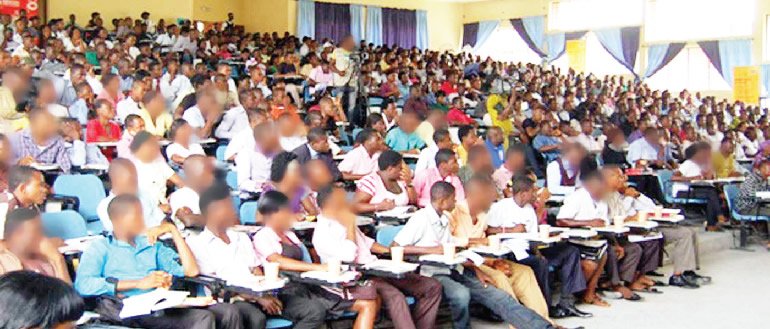
DEBORAH TOLU-KOLAWOLE writes on the poor funding of education in the country and its implications, including industrial actions in universities and the capital fight
The Academic Staff Union of Universities announced its decision to embark on an industrial strike on Monday, February 14, 2022.
While explaining the reason for the strike, the union’s president, Professor Emmanuel Osodeke, blamed the President Muhammadu Buhari-led administration for failing to fulfill its promises to meet some of the demands that were presented by the union, which, according to him, led to the suspension of the strike in 2020.
Osodeke cited some demands which included the release of earned allowances; the deployment of the University Transparency Accountability System for the payment of salaries and allowances of university lecturers; renegotiation of the ASUU-FGN 2009 agreement; and most importantly, the release of revitalisation funds for universities, which, according to the union, will enable Nigerian universities to stay in “shape.”
“Have you seen the poor state of our universities? – the dilapidated buildings, no funding for research, overcrowded classrooms,” Osodeke asked The PUNCH.
However, the strike has continued to linger as the federal government noted that it did not have enough funds to meet some of the demands of the union.
In fact, the Minister of State for Labour and Employment, Festus Keyamo, in an interview, noted that “The Federal Government would not borrow to pay ASUU.”
Similarly, the Governor of Ebonyi State, Dave Umahi, noted that it was impossible for the government to borrow to meet ASUU’s demands. This is as the governor added that “university education is not for everybody.”
Experts, however, are of the opinion that an alternate funding system should be developed to fund universities in Nigeria.
Nigerian federal universities are ranked abysmally low in the world.
Data from webometrics places the four highest ranked federal universities in Nigeria as: University of Ibadan, 1207; Obafemi Awolowo University, 138; University of Nigeria, 1498; and University of Port-Harcourt, 1514 globally.
The interpretation of the data is that no Nigerian federal university is ranked within the top 10% of universities globally.
“This is not shocking,” Reform Education Nigeria’s Ayodamola Oluwatoyin says.
“Our budget for education has always been way below the recommended benchmark by UNESCO.”
The PUNCH reports that the benchmark proposed by UNESCO for the funding of education is 26% of the national budget and 6% of the gross domestic product.
Nigeria’s budget for the education sector has averaged around 8.3% of the budget, which is in sharp contrast to the recommended target and continues to drop.
Youths seek options
“Education is the bedrock of the world’s successful economies. It is essential for sustainable development. Tertiary education, says the World Bank, adding, “It is instrumental in fostering growth, reducing poverty, and boosting shared prosperity.”
As of 2018, data from UNESCO revealed that about 76,338 Nigerians were studying abroad, which is the highest recorded by an African country.
In 2021, Nairametrics noted that data analysed by the Central Bank of Nigeria revealed that Nigerians spent a hefty sum of $28.65bn on foreign education between 2010 and 2020.
“For Nigeria, data shows that whilst Nigeria (ns) has remitted over $28bn to foreign academic institutions, there does not appear to be significant reciprocation in the form of inflows from foreign sources towards Nigeria’s education sector.
Nairametrics also noted that “this situation of huge NET dollar outflows towards foreign academic institutions without any reciprocity has dual adverse effects of resulting in underinvestment in Nigeria’s domestic educational sector whilst simultaneously creating pressure on the Naira exchange rate.”
Data analysed by The PUNCH also revealed that between January 2022 and June 2022, a total of $462.9m was expended on foreign education. The figure is contained in data obtained from the Central Bank of Nigeria, and is calculated based on the data provided on the amount spent on educational services under the sectoral utilisation for transactions valid for foreign exchange.
In January 2022, the apex bank stated that a total of $60,202,730.84 was spent on foreign education, while noting that $69.9m was spent in February 2022.
In March 2022, there was a significant increase as the bank said $87.26m was spent.
In April, the figures dropped a little as a total of $78.62 million was recorded by the apex bank.
The figure for May 2022 was stated to be $82.70m, while the figure for June 2022 was fixed at $84.9m.
Speaking with our correspondent, a Nigerian at a university in the United Kingdom, Philomena Andrew, said, “It is true that we actually enjoy subsidised education in Nigeria, but if we are being honest, our universities lack capacity. I had my Bachelor’s degree in Nigeria but we lack facilities, laboratories, and don’t even get me started on the library and the books there.”
Universities in Nigeria
The Federal Government of Nigeria remains the major financier of Nigerian universities, though university managements take care of some miscellaneous spending through internally generated revenues.
One of these is the cost of electricity. For instance, the University of Lagos was once reported to have paid over N1.1bn as a power bill to Ikeja Electricity Distribution Company. The cleaning of hostels is mostly outsourced by the schools.
When a federal university is established, the federal government votes on a certain amount, known as a ‘take-off grant,’ to enable the smooth sailing of the university.
In recent times, N4bn has consistently been approved for newly established federal universities.
Also, for federal universities, school fees are paid into the Treasury Single Account and the money goes into the coffers of the Federal Government, which gives the institutions subventions from the general purse and pays the university workers. The amount of subvention received by an institution is determined by a variety of factors, including staff strength and student enrollment.
For instance, the University of Nigeria, Nsukka, has a population of about 35,000 students, and each student pays N50,000 as fees, giving a sum of N1.75 billion. The Federal University of Technology, Akure, has about 5,000 students and charges an average of N30,000 as fees, giving a total amount of N150 million; technically, UNN has the tendency to attract a higher subvention rate than FUTA.
Similarly, the government also has its own budget for universities, which is included in the budget prepared for the Federal Ministry of Education.
As of July 2022, the National Universities Commission, the regulatory agency in charge of universities, stated that the country had a total of 49 universities and four inter-university centres.
However, as of the time the 2022 budget was prepared, allocations were only made for the 44 federal universities that existed as of 2021.
In that budget, the Federal Government allocated the sum of N355.47bn to the 44 federal universities from the total budget of N875.93bn given to the education sector.
A civic organisation, BudgIT, in a document made available on its website, noted that out of the N355.47bn allocated to the federal universities, N326.9bn would go for recurrent expenditure, comprising N320.7bn for personnel costs and N6.1bn for overhead costs. Only N25.5bn is slated for capital projects in universities.
The top five universities with the highest allocations are the University of Nigeria, Nsukka, N24.2bn; Ahmadu Bello University, Zaria, N22.6bn; University of Calabar, N19.8bn; University of Benin, N17.7bn; and the University of Ibadan, N17.1bn.





